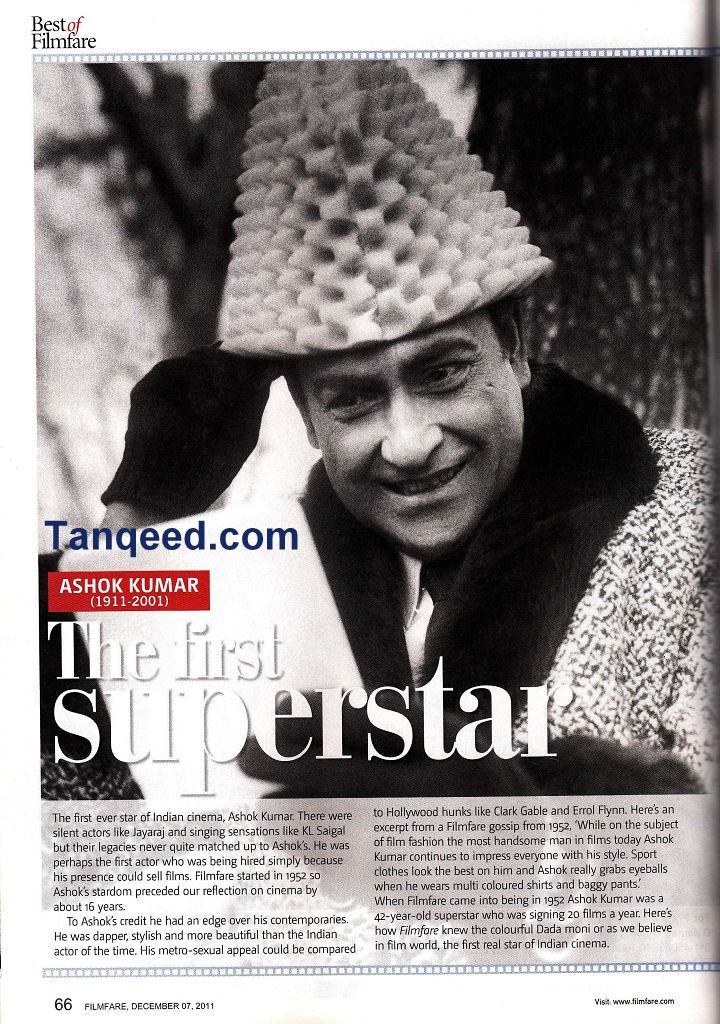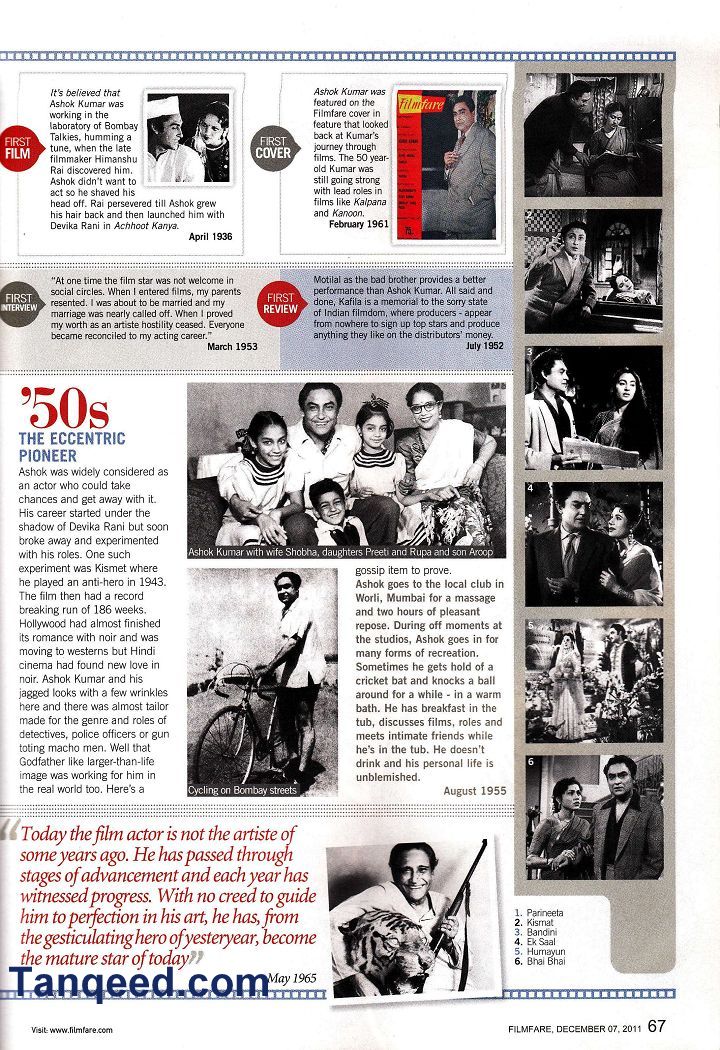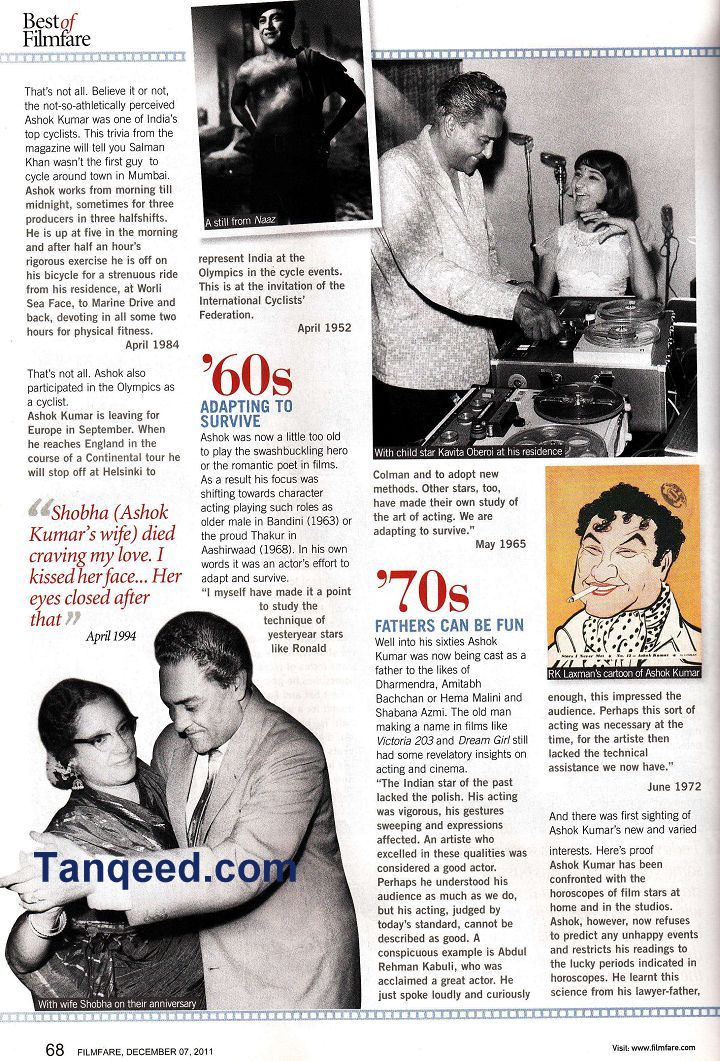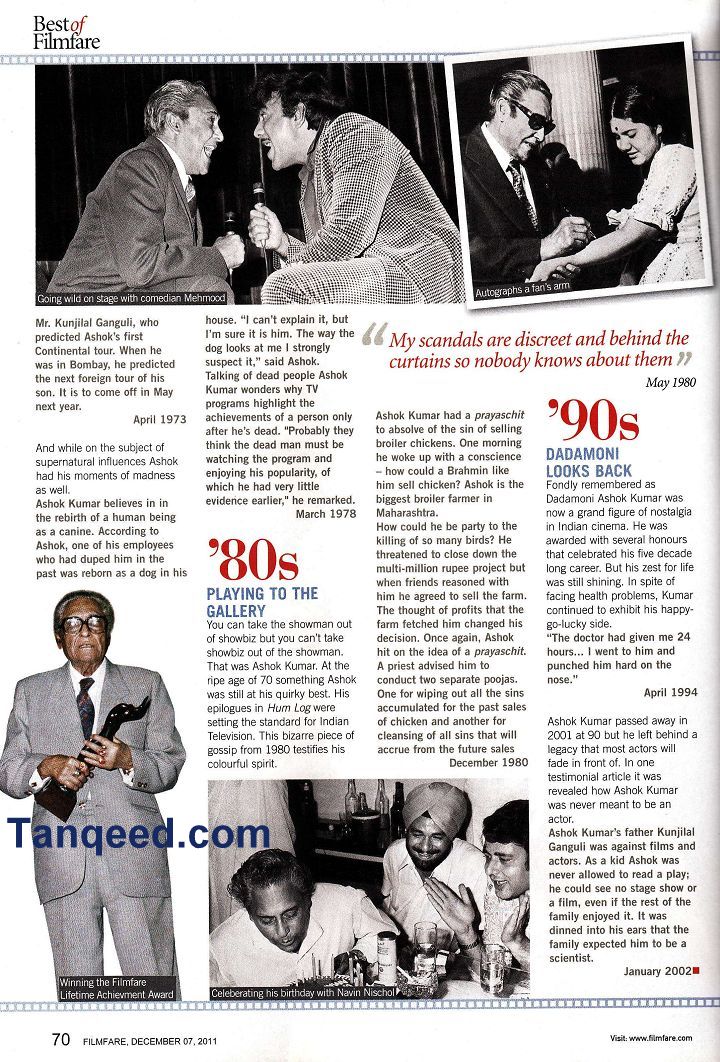Today is Ashok Kumar’s birth anniversary. So check out this Filmfare article on him from 2011.




Today is Ashok Kumar’s birth anniversary. So check out this Filmfare article on him from 2011.




Check out Shekhar Kapur’s Shelved Movie Time Machine Rushes starring Aamir Khan.
“S. Janaki, is an Indian playback singer renowned for her voice modulation abilities, she has sung in many Indian...
Check out this Rajesh Khanna Interview and Career and Boxoffice Analysis from Star & Style Magazine 1975. Rajesh Khanna...
Today is megastar Katrina’s birthday so presenting my fav songs on her: Zara Zara Touch me Though the song...
Today is Rekha’s birthday so check out this Filmfare Article on Rekha from 2011. It has Rekha’s quotes over...
Best Picture – English Vinglish A Delightfully Sweet Movie with One of the Strongest Female Protagonist I’ve Seen on...
The song Zoobie Zooby from Dance Dance is copied from a song by Modern Talking. The music director for...
Saw Mohammad Ali the other day on TV casually surfing through the chapters of TV.He was like a vibrant...
Another Filmfare Article on Ashok Kumar from Filmfare 2001
Remember the time…
Home alone: Ashok Kumar
Devika Rani smiles down from the wall. Kishore Kumar laughs from the opposite side while Himanshu Rai’s bust sits proudly on the shelf. Memories of another day hang in the air. So does silence. Nostalgia engulfs me as I walk into his room. A very frail- looking Ashok Kumar sits amidst oxygen cylinders and trays stacked with medicines. He’s perceptibly weaker than the last time I met him. The eyes have sunken further, so have the cheeks. He smiles weakly, “What else do you expect of a 90-year-old man? I’m suffering from various ailments but it’s my age that’s the main culprit. For years I fought asthma, but I’ve given up now. I know my end is near. It’s imminent. I’m just waiting for it.” Wiping his glasses, he tells me of the time when he was hospitalised at Jaslok for four months. He mumbles, “The doctors had given up on me. 24 hours was all they said I had. I don’t remember those days. But I’m told that when I heard his words, I went after the doctor and punched him hard on the nose. I don’t know where I summoned that kind of energy from, but the hospital staff had to restrain me with injections.”
Bimal Roy shot Do Bigha Zameen at my expense. I was hurt. He had acted like a typical Bengali
He continues, “I’m told that I only spoke in Bengali those days. And that I kept referring to some war that was going on. I don’t know what had happened to me. But I survived it all. Strangely, I don’t remember a thing.” Dadamoni lives alone in his bungalow with only his nurse-maid and secretary for company. His voice drops an octave as he says, “My daughter and son visit me daily. I’m comfortable being on my own. I’m cut off from the film industry. Earlier, industry folks would call me with film offers. But I can’t even walk two steps without support so where’s the question of acting anymore?” With a sigh he continues, “All my friends have passed away. I’m all alone. But people from the industry do call me from time to time. Sunil Dutt, Amrish Puri, Hrishikesh Mukherji and Shakti Samanta do keep in touch. The other day Amitabh Bachchan came to visit me. He sat on this chair. He often calls to enquire after my health.” Just then the phone rings. It’s Hrishikesh Mukherji. Dadamoni is amused when Hrishida tells him that he loves him the most in the world. Putting down the phone, he laughs, “Hrishikesh is such a dear man. He was my assistant at Bombay Talkies.”
Nalini Jaywant’s a recluse. She doesn’t meet anyone. Not even me
His thoughts stray to the sepia days. He rewinds, “Imagine, I never ever wanted to become an actor. I came to Bombay to become a director. Those days, actors were really looked down upon. They were believed to come from the lowest strata of society. So I joined Bombay Talkies as a technician. I worked in the camera department. Later, I was made a lab assistant.” It was sheer fluke that he became an actor. Seems the leading man of Jeevan Naiyya had fallen ill. The grand old man of Hindi cinema narrates earnestly, “Himanshu Rai pleaded with me to step in. He said he stood to lose a huge amount of money as his set was ready. I refused saying that I wasn’t interested. But he wouldn’t listen. Ultimately, I gave in. But the German director, Franz Osten, took one look at me and rejected me outright saying, `You’ll never make it as an actor.’ “I was indignant. I yelled at him saying that I didn’t want to become an actor. After all, only pimps and prostitutes became actors. Surprisingly, Himanshu had great faith in my abilities. Even though I was determined that I wouldn’t act in films. Yet, despite my resolve, Himanshu convinced me to do Achhut Kanya,” he laughs.
The doctor had given me 24 hours… I went after him and punched him hard on the nose
After Achhut Kanya became a hit, there was no looking back. Movies like Izzat, Savitri, Prem Kahani and Janambhoomi brought him more fame and glory. He reminisces, “I remember the first time I received a salary of Rs 150. It was a princely sum those days. I was so excited that I didn’t know what to do with so much money. I didn’t even know where to keep it. So I tore open my pillow and stuffed the money in it.” His rise to fame however rattled his parents. He grins, “My mother was certain that since I’d joined films, I would fall into bad ways. So without letting me know, she arranged my marriage. I didn’t even see my wife before the wedding. Meeting your bride before mariage wasn’t the done thing then.” His eyes stray to his late wife’s photograph on the wall. He recalls, “We lived together for 50 years. But ours wasn’t really a happy marriage. Mainly because Shobha started drinking heavily. I tolerated her for a while. But then my patience ran out. Each evening, I would come home to find her sozzled. She couldn’t even serve me dinner or talk to me properly. Those days we used to live in Malad. Since I was fed up with her, I brought this plot in Chembur and built the bungalow in instalments. I then shifted here.” He continues, “We stayed separately for quite a while. But then she followed me here. She apologised and so I let her stay. But she could never give up drinking. It was sad because I tried my best to help her.” He narrates that his wife died just two days before their 50th wedding anniversary. “She was in the hospital for quite some time,” he recalls. “She was keen to celebrate our golden wedding anniversary. We’d called over all our friends and relatives. But two days before the occasion, she passed away. When I went to see her for the last time, her eyes were half open. I was told that the eyes remain open when a person’s wishes remain unfulfilled. I knew she’d died craving my love. I kissed her face. And strangely, her eyes closed after that.” His eyes turn misty as he reminisces, “I didn’t go to the shamshaan when they took her. I don’t like deaths. Even when Kishore and Anoop died, I refused to go and see them. I want to retain their happy memories.” He closes his eyes as memories overwhelm him. Then, smiling sadly, he adds, “So many things have happened in my life. I can’t recall even half of them. Blame my old age.”
I didn’t have as many affairs as were insinuated. There were just five or six women
I want to know about his colourful life and he retorts, “You mean women?” I nod. And he continues, “I didn’t have as many affairs as were insinuated. There were just five or six women in my life. But I’m not going to tell you their names. It would be very ungentlemanly to kiss and tell. Would you like it if someone did that to you?” Oh, oh. I mention Nalini Jaywant’s name and he refuses to comment on his relationship with her. All he says is, “She lives nearby. She’s a recluse. She doesn’t meet anyone. Not even me. I don’t know what’s happening with her.” Memories return in spurts. He talks of the superhit movie Kismet which ran for an unprecendented 187 weeks in 1943. “Kismet is one of the biggest hits in the history of Indian cinema,” he says proudly. “At Bombay Talkies we realised that somehow our movies weren’t as gripping as those made in Hollywood. A friend from Hollywood sent us a book, Screenplay Writing by Francis Marian. The book opened our eyes to a far more complex world of film-making. It vividly explaned how to write a scene, how to establish the characters. Kismet was full of Francis Marian’s influence.”
Shobha died craving my love. I kissed her face… Her eyes closed after that
But sadly after Kismet the entire team of Bombay Talkies (Himanshu Rai, Devika Rani, Gyan Mukherji, Shashadhar Mukherjee and Ashok Kumar) broke up. Himanshu Rai died. Devika Rani took over. Dada Moni states, “But she started playing politics. She brought in another director, Amiya Chakravarthy, in place of Gyan Mukherji. This hurt us. So we decided to leave Bombay Talkies.” Ashok Kumar then started Filmistan Studios. He made movies like Eight Days, Chal Chal Re Naujawan, Begum, Shikari, Humayun and Saajan. “Though I was busy with Filmistan Studios, the desire to return to Bomaby Talkies was always there.” He rebought Bombay Talkies in 1947. “Devika Rani had left by then. But the Talkies had fallen on bad days. The debts amounted to Rs 28 lakhs. We made movies like Majboor, Ziddi, Mahal and Mashal to repay the debts.” He recalls spotting a young boy taking notes on the sets of Mashal. He smiles, “Bombay Talkies had strict rules. Outsiders weren’t allowed on the sets. So I was curious when I saw spotted him on two or three days consecutively. Then Nitin Bose told me that the boy was his nephew. I let him be. Three years later he made his first film and hit the international cinema. He was Satyajit Ray and the film was Pather Panchali. So in a way he was the product of Bombay Talkies too.” But certain memories rankle even today. Like for instance the time when Bimal Roy duped Dadamoni. Remembers he, “Bimal was making Parineeta for me. But he went ahead and launched Do Bigha Zameen. I was upset but I kept quiet. One day he told me that he wanted to shoot certain scenes of Parineeta in Calcutta. Though I couldn’t see much sense in that, I allowed him to go. He took my entire crew. “Later I realised that he’d shot the entire Do Bigha Zameen at my expense. I confronted him and he pacified me by saying that Parineeta would be a mind-blowing film. I told him categorically that Parineeta would release before Do Bigha Zameen. He agreed. But he cheated me again. He completed Do Bigha Zameen and released it before Parineeta. I was hurt. I told him he had acted like a typical Bengali. I severed all relations with him.”
Franz Osten, took one look at me and said `You’ll never make it as an actor.’
Ashok Kumar later worked with Bimal Roy in Bandini. He explains, “Nutan had recommended my name. When Bimal Roy approached me, I refused to acknowledge his presence, I sent a message to tell him to get out of my house. Then everyone started persuading me to work with him. Ultimately I relented and we patched up. But I could never forget that he had cheated me. Anyway he’s dead. I don’t have any ill-feelings towards him today.” Talking takes a toll on him. And he breaks into a bout of coughing. “Talking tires me easily these days.” He closes his eyes once again. Then he says, “I worked for 65 years. I don’t miss those days. Those were the worker days. I earned plenty of money. I’ve given it all to my son to distribute it as he wishes amongst the relatives. He gives me money for my meals. That’s all I need these days.”
https://downloads.movies.indiatimes.com/site/feb2001/tunen2.html
From the book “Stars from Another Sky: The Bombay Film World of the 1940s” by Saadat Hasan Manto
“Ashok’s popularity increased day by day. Since he didn’t go out much and kept to himself, whenever people did catch a glimpse of him riots followed. Traffic came to a halt, fans crowded around him, and eventually the police would be forced to use their batons to save him from his admirers’ extreme adulation.”
I had read this story long time back in a newspaper.
“The riots were at their height. One day on our way home from the Talkies we stopped for quite a while at Ashok’s place. In the evening he offered to drive me home. To take a shortcut he drove through a belliger-ent Islamic neighborhood. A wedding procession was coming from up ahead. The minute I heard the band playing, I lost my wits. I clutched at Ashok’s hand and shouted, “Dadamuni, where have you come?”
Ashok understood my anxiety, smiled and said, “Don’t worry.”
How could I not worry? The car was passing through a fanatically Muslim neighborhood where no Hindu dared set foot. To top it off, just about everyone recognized Ashok and knew that he was a Hindu, a famous Hindu whose murder would put quite a feather in their caps. I didn’t know any prayers in Arabic, nor even a single verse from the Qur’an suitable for the situation. I was cursing myself and praying inco-herently in my own words with my heart pounding away: “Dear God, don’t let me down. Please don’t let any Muslim kill Ashok or I’ll have to keep my face bowed down out of shame and guilt for the rest of my life.” This wasn’t the face of my community, but my own, and yet I didn’t want it to be lowered before another community because of such a heinous act.
When the car came near the wedding procession people started to shout, “Ashok Kumar, Ashok Kumar.” I froze. But Ashok kept his hands on the steering wheel and remained quiet. I was about to shake off the numbing sense of fear and tell the mob to be sensible, that I was a Mus-lim and that he was escorting me back to my place, when two young men stepped forward and said calmly, “Ashok Bhai, you won’t find a way through up ahead. Here, drive through this side street.”
Ashok Bhai? Ashok was their brother. Then who was I?
I took a quick look at my clothes; they were made of khadi. God knows who they thought I was. Then again, it was quite likely that in Ashok’s presence they hadn’t noticed me at all.
When our car pulled out of that neighborhood, oh, did I breathe a sigh of relief! Just as I was thanking God, Ashok laughed and said, “You panicked for no reason at all. These people—they don’t bother artists.”
https://www.urdustudies.com/pdf/16/20_Manto_AshokKumar.pdf
so now who is the first superstar? rajesh khanna or ashok kumar or dilip kumar
@Rotlu
When Ashok Kumar was a superstar (and I am not saying greatest by footfall or collection or consistency or any such theory etc etc) – india was still under rule of british / or coming out of it.
Media (whatever it was back then) or all the attention was more towards the freedom fight related issues – so you will never see in print . the prood of Ashok Kumar’s suerstardom. All I can say is , in my childhood (early-mid 80s) I have been fortunate enough to be surrounded by ex-freedom fighters and overheard a lot of things in their meetings. These freedom fighters were also die-hard fans of Saigal and Ashok Kumar and in their discussion they always told how nation was crazy and swept away by Ashok Kumar the star/actor and Saigal the singer.
Media may have given the title of “Superstar” officially to Rajesh Khanna first but that does not mean they were no superstars before that.
I once checked about Ashok Kumar and Saigal with my grandfather who died recently. He had seen Achhoot Kanya in a theater too. He said Ashok Kumar and Saigal were both the top stars of that time – that Ashok Kumar was from Bombay Talkies and Saigal from Calcutta Studios and that people used to go to Saigal movies just to see him sing.
I was just curious to know your opinion… Thanks ritz and sputnik… Well In my opinion whoever have ruled the hearts of the nation are superstars and I don’t go with media or magazine articles. Since this is from filmfare article they were contradicting themselves and hence thought of knowing your opinion as well… Even my dad praises ashok kumar a lot 😉